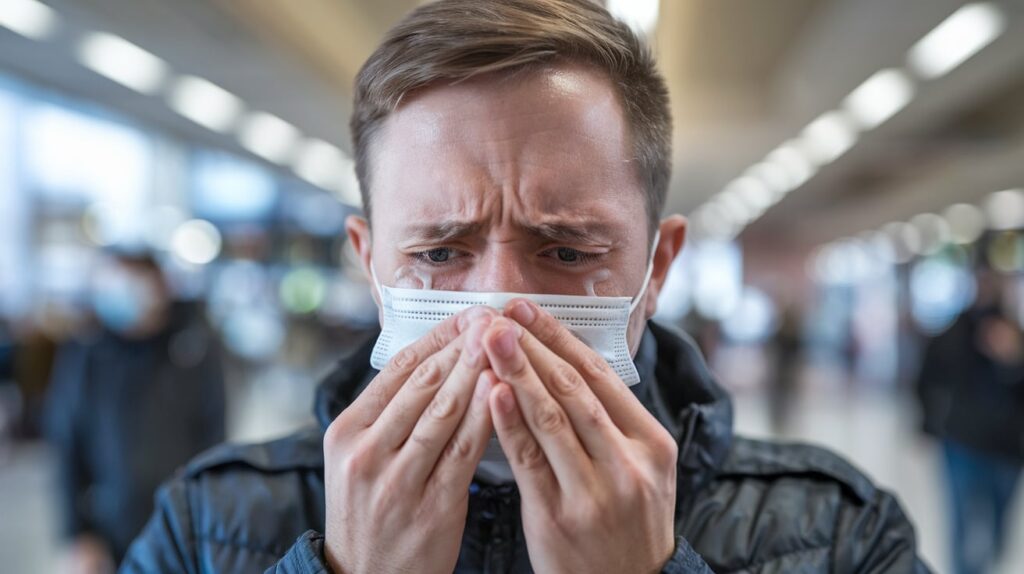What is the most common sickness in winter? What exactly do you notice most during the winter months? The chilly air, the muted colors of nature, or perhaps the sudden surge in coughs, sneezes, and stuffy noses around you. Wintertime often brings along a slew of common illnesses that seem to lurk just around the corner, waiting for the opportunity to invade our lives.
Let’s try and unravel the details about the most common sicknesses that tend to flourish in winter and what you can do to protect yourself.
Understanding Winter Illnesses
As the temperatures drop and daylight hours dwindle, your body goes through various changes, both physically and emotionally. Your immune system may weaken, decreasing your defenses against common infections. This season is notorious for a range of ailments, but understanding these illnesses can help you anticipate and potentially avoid them.
The Role of Your Immune System
Before we get into specific sicknesses, it’s important to talk about your immune system. During winter, any drop in temperature can affect the way your body fights off germs. Lower humidity levels may also dry out the mucous membranes in your respiratory tract, making it easier for viruses to invade. In this environment, it becomes ever more crucial to support your immune system.

Common Winter Illnesses
Several illnesses tend to spike during the winter months. Here’s a closer look at these common afflictions:
Influenza (The Flu)
The flu is one of the most notorious winter illnesses. You might think of it as just a bad cold, but the flu is caused by specific viruses that can result in severe symptoms.
Symptoms of the Flu
- High fever
- Severe body aches
- Cough
- Fatigue
- Headaches
- Sore throat
How It Spreads
The flu spreads through droplets in the air when someone infected coughs or sneezes. It’s also present on surfaces that people touch frequently, so think doorknobs and light switches.
Prevention Tips
- Get Vaccinated: Flu shots are recommended annually.
- Practice Good Hygiene: Wash your hands regularly and avoid close contact with infected individuals.
- Strengthen Your Immune System: Maintain a healthy diet and regular exercise.
Common Cold
While often less severe than the flu, the common cold can still leave you feeling miserable.
Symptoms of a Cold
- Runny or stuffy nose
- Sore throat
- Cough
- Sneezing
- Mild headache
How It Spreads
Like the flu, colds spread through respiratory droplets or direct contact with contaminated surfaces.
Prevention Tips
- Hand Washing: Frequent hand washing is essential.
- Avoid Touching Your Face: This practice helps minimize the chance of introducing viruses into your system.
Stomach Flu (Gastroenteritis)
Though often confused with the influenza virus, the stomach flu is a different beast entirely, affecting your gastrointestinal tract.
Symptoms of Stomach Flu
- Diarrhea
- Vomiting
- Nausea
- Stomach cramps
How It Spreads
Gastroenteritis can spread through contaminated food or water, and through close contact with someone who is infected.
Prevention Tips
- Stay Hydrated: Drink plenty of fluids if you start feeling unwell.
- Avoid Contaminated Food: Be mindful of hygiene in food preparation.
Seasonal Affective Disorder (SAD)
Though not a physical illness, Seasonal Affective Disorder affects many people during the winter months. As the days get shorter, your mood may take a dip.
Symptoms of SAD
- Feelings of hopelessness
- Low energy
- Difficulty concentrating
- Changes in sleep patterns
How It Manifests
The lack of sunlight may affect neurotransmitter levels in your brain, leading to feelings of depression and lethargy.
Prevention Tips
- Light Therapy: Consider using a light therapy box that mimics natural sunlight.
- Stay Active: Regular exercise can uplift your mood.
Respiratory Syncytial Virus (RSV)
RSV is another virus that commonly affects young children. However, adults can also contract it.
Symptoms of RSV
- Runny nose
- Decrease in appetite
- Cough
- Sneezing
- Fever
How It Spreads
RSV spreads through respiratory droplets and can linger on surfaces.
Prevention Tips
- Good Hygiene Practices: Keeping hands clean can make a huge difference.
- Limit Exposure: If someone close to you is infected, take precautions.

Staying Healthy in Winter
Even though the winter months can seem like an uphill battle against various illnesses, there are several preventative measures to keep yourself and your loved ones healthy.
Nutritional Support
Eating well plays a vital role in supporting your immune system. Consider incorporating the following foods:
- Citrus Fruits: Rich in Vitamin C, they can help boost your immune defenses.
- Garlic: Known for its antimicrobial and antiviral properties.
- Yogurt: Contains probiotics that support gut health.
Hydration
Staying hydrated is often overlooked during the winter months. Accordingly, drinking enough water can help your body function optimally and maintain a robust immune system. Warm herbal teas and broths can also be comforting.
Regular Exercise
Though you might prefer staying cozy indoors, regular physical activity can bolster your immune system. Try to aim for at least 30 minutes of moderate exercise most days of the week.
Prioritize Sleep
Quality sleep is essential for your immune system to work effectively. Ensure you’re getting enough restful sleep by establishing a calming bedtime routine. This might involve reading, meditating, or simply unwinding with a warm cup of tea.
Stress Management
Chronic stress can weaken your immune response. Engaging in activities that promote relaxation—such as yoga, deep breathing exercises, or mindfulness—can help you navigate the stressful winter months with greater ease.

When to Seek Medical Attention
Sometimes, despite your best efforts, you may find yourself under the weather. Know when it’s time to seek medical guidance. Signs that you should consult a healthcare professional include:
Worsening Symptoms
If your symptoms seem to be worsening instead of improving, it’s essential to reach out for help. For example, a persistent fever or increasing shortness of breath should not be taken lightly.
Persistent Cough
A cough that lasts beyond a couple of weeks or produces blood should prompt a medical consultation.
Dehydration
If you’re unable to keep fluids down due to vomiting or diarrhoea, dehydration can become a serious concern.
Essential Remedies
While prevention is always the best approach, there are ways to alleviate some symptoms if you do catch a common winter illness.
Over-the-Counter Solutions
Depending on your symptoms, certain over-the-counter medications can provide relief. For example:
| Symptom | Recommended OTC Medication |
|---|---|
| Fever and aches | Acetaminophen or Ibuprofen |
| Congestion | Decongestants |
| Cough | Cough suppressants or expectorants |
Home Remedies
There are several tried-and-true home remedies that may ease symptoms:
- Honey and Lemon: A warm mug of honey and lemon can soothe a sore throat.
- Saltwater Gargle: Diluting salt in warm water can help alleviate throat discomfort.
- Steam Inhalation: Inhaling steam from hot water can relieve congestion.
The Bigger Picture: Immunity and Wellness
Maintaining your health during winter encompasses more than just avoiding illness. It’s about nurturing your body and mind, fostering resilience against the backdrop of winter’s chill. Embrace this season as a time for self-care and rejuvenation.
Seasonal Reflection
Take a moment to reflect each winter on how you’ve weathered past winters. Consider what you’ve learned about maintaining your health, and think about how you can carry those lessons into the colder months ahead.
Building Community Connections
In winter’s cold embrace, it may be tempting to hibernate, but social connections can support your mental health. Gatherings, whether virtual or in person, can keep spirits high and promote emotional healing.
Conclusion of What Is The Most Common Sickness In Winter
Winter undeniably has its charms, from the way snow blankets the ground to the joy of holiday gatherings. However, it also brings its share of challenges with common illnesses. By understanding these ailments and taking proactive steps, you can protect yourself and others from the seasonal sicknesses that are all too common.
Remember, staying informed and prepared will always be your best defense during the winter months. So gather your resources, stay warm, and embrace winter with confidence!


